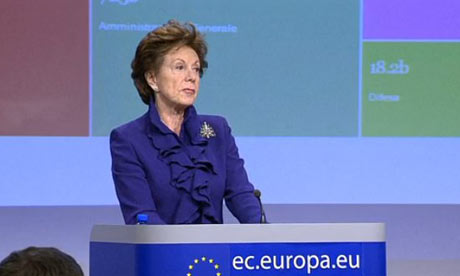The best way to get value from data is to give it away
Yesterday European Vice President Neelie Kroes unveiled a new package of policies related to open data and public sector information

Neelie Kroes making EC open data announcement from okfn on Flickr Photograph: Guardian
Last Friday I wrote a short piece on for the Datablog giving some background and context for a big open data big policy package that was announced yesterday morning by Vice President Neelie Kroes. But what does the package contain? And what might the new measures mean for the future of open data in Europe?
The announcement contained some very strong language in support of open data. Open data is the new gold, the fertile soil out of which a new generation of applications and services will grow. In a networked age, we all depend on data, and opening it up is the best way to realise its value, to maximise its potential.
There was little ambiguity about the Commissioner's support for an 'open by default' position for public sector information, nor for her support for the open data movement, for "those of us who believe that the best way to get value from data is to give it away". There were props to Web Inventor Tim Berners-Lee, the Open Knowledge Foundation,OpenSpending, WheelMap, and the Guardian Datablog, amongst others.
But will Brussels walk the walk? What is actually in the package? Two very concrete, more or less straightforward things topped the bill: data and cash. Firstly, the European Commission will lead the way by pioneering open data policies and practises that it would like to see adopted by EU member states. "Eating your own dogfood", as software developers affectionately call it. They will open up documents and datasets from across dozens of institutions - no mean feat, as I'm sure UK Government representatives will have told Neelie when she and her team visited Number 10 earlier this year.
Secondly the Commission will put up €100 million in financial support for research into "data-handling technologies". This will no doubt stimulate cross-border collaboration around tools and technologies that will enable more people, projects, organisations and companies to derive value from data. Hopefully some of this will support some of the wonderful work that is already going on to clean up, harmonise, and expose data to the public - as well as funding the creation of more easy to use open source tools and applications that consume it to help us do more useful things and answer more sophisticated questions.
No comments:
Post a Comment
Note: Only a member of this blog may post a comment.